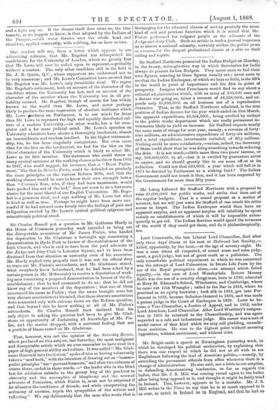Our readers will see, Irons a letter which appears in
our advertising columns, that Mr. Bagehot has relinquished his candidature for the University of London, which we greatly fear that Mr. Lowe will now be called upon to represent,—probably without a contest. The only other candidate still in the field. is Mr. J. R. Quoin, Q.C., whose supporters are understood not to be very numerous ; and Mr. Lowe's Committee have avowed that Mr. Bagehot was Mr. Lowe's only formidable rival. We regret Mr. Bagehot's retirement, both on account of the character of the candidate whom the University has lost, and on account of the character of the member whom the University has in all pro- bability secured. Mr. Bagehot, though of course far less widely known to the world than Mr. Lowe, and never perhaps likely to produce the same impression of absolute brilliance which Mr. Lowe produces on Parliament, is to our minds far fitter than Mr. Lowe to represent the high and equably distributed cul- ture of a modern University,—in other words, has a far com- pleter and a far more judicial mind. Mr. Lowe's speeches on University education have shown a thoroughly incoherent, almost an inconsiderate and random intellect. In the higher statesman- ship, too, he has been singularly unsagacious. But even more
than for the blot on the intellectual, we feel for the blot on the liberal character of the University which is likely to select Mr.
Lowe as its first member. The statesman who could throw so many cynical sarcasms at the working classes as he threw from 1865 to 1867, who could suggest, for instance, that a "Beast Parlia-
ment," like that in Reineke Fuchs, could be defended on precisely
the same principles as the various Reform Bills, and that the working classes would be sure to know their own strength better than " Currau's fleas, who, if they had been unanimous, would have pushed him out of the bed," does not seem to us a fortunate choice for the most liberal of our English Universities. Mr. Bage- hot is a generous rival, and says nothing of Mr. Lowe but what is kind as well as true. Perhaps he might have been more suc- cessful if he had entered more keenly into the feelings of pain and indignation excited by Mr. Lowe's cynical political epigrams and misanthropic political creed.






























 Previous page
Previous page